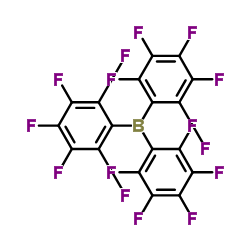Tris(perfluorophenyl)borane

Tris(perfluorophenyl)borane structure
|
Common Name | Tris(perfluorophenyl)borane | ||
|---|---|---|---|---|
| CAS Number | 1109-15-5 | Molecular Weight | 511.98 | |
| Density | 1.7±0.1 g/cm3 | Boiling Point | 327.3±42.0 °C at 760 mmHg | |
| Molecular Formula | C18BF15 | Melting Point | 126-131 °C(lit.) | |
| MSDS | Chinese USA | Flash Point | 151.7±27.9 °C | |
| Symbol |

GHS07 |
Signal Word | Warning | |
|
Reactivity of Amine/E(C6F5)3 (E = B, Al) Lewis Pairs toward Linear and Cyclic Acrylic Monomers: Hydrogenation vs. Polymerization.
Molecules 20 , 9575-90, (2015) This work reveals the contrasting reactivity of amine/E(C6F5)3 (E = B, Al) Lewis pairs toward linear and cyclic acrylic monomers, methyl methacrylate (MMA) and biorenewable γ-methyl-α-methylene-γ-butyrolactone (γMMBL). While mixing of 2,2,6,6-tetramethylpiper... |
|
|
Mussel-Inspired Anchoring of Polymer Loops That Provide Superior Surface Lubrication and Antifouling Properties.
ACS Nano 10 , 930-7, (2016) We describe robustly anchored triblock copolymers that adopt loop conformations on surfaces and endow them with unprecedented lubricating and antifouling properties. The triblocks have two end blocks with catechol-anchoring groups and a looping poly(ethylene ... |
|
|
Octahedral Group 4 Metal Complexes That Contain Amine, Amido, and Aminopyridinato Ligands: Synthesis, Structure, and Application in alpha-Olefin Oligo- and Polymerization.
Inorg. Chem. 35 , 6742, (1996) The reaction of trimethylsilyl-substituted 2-aminopyridines with mixed chloro(dialkylamido)metal complexes (titanium and zirconium) leads via amine elimination to octahedral group 4 metal complexes that contain amine, amido, and aminopyridinato ligands. The X... |
|
|
Organometallics 15 , 3600, (1996)
|
|
|
J. Am. Chem. Soc. 118 , 10008, (1996)
|
|
|
Facile heterolytic cleavage of dihydrogen by phosphines and boranes.
J. Am. Chem. Soc. 129 , 1880, (2007)
|
|
|
Microfluidic Separation of Ethylene and Ethane Using Frustrated Lewis Pairs.
ChemSusChem 8 , 4202-8, (2015) Separation of gaseous olefins and paraffins is one of the most important separation processes in the industry. Development of new cost-effective technologies aims at reducing the high energy consumption during the separation process. Here, we took advantage o... |